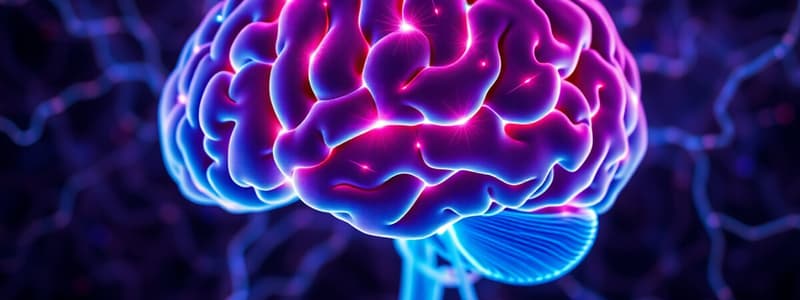Podcast
Questions and Answers
What type of explicit long-term memory is characterized by general facts or information?
What type of explicit long-term memory is characterized by general facts or information?
- Semantic memory (correct)
- Procedural memory
- Implicit memory
- Episodic memory
Which aspect of memory do individuals with medial temporal lobe amnesia find particularly challenging?
Which aspect of memory do individuals with medial temporal lobe amnesia find particularly challenging?
- Recalling specific life events (correct)
- Remembering facts
- Forming implicit memories
- Retaining intellectual functioning
How does medial temporal lobe amnesia affect the formation of long-term memories?
How does medial temporal lobe amnesia affect the formation of long-term memories?
- Implicit memories cannot be formed
- Only episodic memories are retained
- Explicit long-term memories cannot be formed (correct)
- Both explicit and implicit memories are unaffected
What is a notable symptom of medial temporal lobe amnesia, as evidenced by patients like H.M.?
What is a notable symptom of medial temporal lobe amnesia, as evidenced by patients like H.M.?
Which of the following statements about implicit long-term memories is accurate in the context of medial temporal lobe amnesia?
Which of the following statements about implicit long-term memories is accurate in the context of medial temporal lobe amnesia?
What role do entorhinal grid cells play in memory processing?
What role do entorhinal grid cells play in memory processing?
What defines a concept cell?
What defines a concept cell?
What is the primary effect of long-term potentiation (LTP) in the context of learning?
What is the primary effect of long-term potentiation (LTP) in the context of learning?
How is long-term depression (LTD) different from long-term potentiation (LTP)?
How is long-term depression (LTD) different from long-term potentiation (LTP)?
What is metaplasticity in the context of synaptic plasticity?
What is metaplasticity in the context of synaptic plasticity?
What is the purpose of using optogenetics in studying engram cells?
What is the purpose of using optogenetics in studying engram cells?
Which brain structure is primarily associated with processing implicit memories?
Which brain structure is primarily associated with processing implicit memories?
What does infantile amnesia refer to?
What does infantile amnesia refer to?
What is the primary distinction between learning and memory?
What is the primary distinction between learning and memory?
What would likely happen without the abilities to learn and remember?
What would likely happen without the abilities to learn and remember?
Which brain structures are specifically mentioned as involved in learning and memory processes?
Which brain structures are specifically mentioned as involved in learning and memory processes?
How is neuroplasticity related to learning and memory?
How is neuroplasticity related to learning and memory?
Which statement best reflects the impact of memory on personal identity?
Which statement best reflects the impact of memory on personal identity?
Which of the following statements is false regarding the functions of learning and memory?
Which of the following statements is false regarding the functions of learning and memory?
What does the discussion imply about experiences without memory?
What does the discussion imply about experiences without memory?
What is the relationship between learning and neuroplasticity?
What is the relationship between learning and neuroplasticity?
What was the main objective of the test involving the fragmented drawings used in H.M.'s case?
What was the main objective of the test involving the fragmented drawings used in H.M.'s case?
How did H.M.'s case contribute to the understanding of memory?
How did H.M.'s case contribute to the understanding of memory?
What key area of the brain was highlighted in studies following H.M.'s case?
What key area of the brain was highlighted in studies following H.M.'s case?
What was H.M.'s performance like on the test after an hour?
What was H.M.'s performance like on the test after an hour?
What was significant about the fragmented drawings utilized in H.M.’s memory test?
What was significant about the fragmented drawings utilized in H.M.’s memory test?
What was the consequence of the insights gained from H.M.'s case?
What was the consequence of the insights gained from H.M.'s case?
What was the nature of H.M.'s inability during the task despite improved performance?
What was the nature of H.M.'s inability during the task despite improved performance?
What does H.M.'s case primarily illustrate about specialized brain functions?
What does H.M.'s case primarily illustrate about specialized brain functions?
What primarily causes the brain dysfunction in Korsakoff's syndrome?
What primarily causes the brain dysfunction in Korsakoff's syndrome?
Which of the following is NOT a symptom of Korsakoff's syndrome?
Which of the following is NOT a symptom of Korsakoff's syndrome?
What aspect of memory consolidation does Hebb's theory imply?
What aspect of memory consolidation does Hebb's theory imply?
What aspect of memory testing showed improvement in N.A. over time?
What aspect of memory testing showed improvement in N.A. over time?
Which part of the brain is indicated to play a special role in memory consolidation?
Which part of the brain is indicated to play a special role in memory consolidation?
What specific brain damage was revealed by the MRI of N.A. in the late 1980s?
What specific brain damage was revealed by the MRI of N.A. in the late 1980s?
Which of the following correctly describes the duration of N.A.’s retrograde amnesia at follow-up?
Which of the following correctly describes the duration of N.A.’s retrograde amnesia at follow-up?
What was the outcome for retrograde memories after the bilateral medial temporal lobectomy in the case of H.M.?
What was the outcome for retrograde memories after the bilateral medial temporal lobectomy in the case of H.M.?
Postmortem examination in Korsakoff's syndrome typically reveals lesions in which area?
Postmortem examination in Korsakoff's syndrome typically reveals lesions in which area?
Which study is notable for finding a long gradient of ECS-produced retrograde amnesia?
Which study is notable for finding a long gradient of ECS-produced retrograde amnesia?
What happens to a memory each time it is activated, according to the content?
What happens to a memory each time it is activated, according to the content?
Which symptom is specifically noted to improve in N.A. over the years?
Which symptom is specifically noted to improve in N.A. over the years?
What type of damage is predominantly associated with Korsakoff's syndrome according to the content?
What type of damage is predominantly associated with Korsakoff's syndrome according to the content?
What is one of the primary focuses of studies employing ECS?
What is one of the primary focuses of studies employing ECS?
Which of the following is a suggested effect of links formed through memory activation?
Which of the following is a suggested effect of links formed through memory activation?
What have studies found about the gradients of retrograde amnesia since the 1950s?
What have studies found about the gradients of retrograde amnesia since the 1950s?
Flashcards
Learning and Memory
Learning and Memory
Neuroplastic processes that involve the brain changing its function in response to experiences. Learning focuses on how experience alters the brain, while memory stores and reactivates these changes.
Neuroplastic Processes
Neuroplastic Processes
Changes in the brain's structure and function in response to experiences.
Medial Temporal Lobes
Medial Temporal Lobes
Brain regions crucial for learning and memory processes, specifically including areas impacted in notable cases like H.M.
Learning
Learning
Signup and view all the flashcards
Memory
Memory
Signup and view all the flashcards
Hippocampal Place Cells
Hippocampal Place Cells
Signup and view all the flashcards
Entorhinal Grid Cells
Entorhinal Grid Cells
Signup and view all the flashcards
Concept Cells
Concept Cells
Signup and view all the flashcards
Engram Cells
Engram Cells
Signup and view all the flashcards
Long-Term Potentiation (LTP)
Long-Term Potentiation (LTP)
Signup and view all the flashcards
Long-Term Depression (LTD)
Long-Term Depression (LTD)
Signup and view all the flashcards
Metaplasticity
Metaplasticity
Signup and view all the flashcards
Infantile Amnesia
Infantile Amnesia
Signup and view all the flashcards
Smart Drugs
Smart Drugs
Signup and view all the flashcards
Posttraumatic Amnesia
Posttraumatic Amnesia
Signup and view all the flashcards
H.M.'s case
H.M.'s case
Signup and view all the flashcards
Medial temporal lobe
Medial temporal lobe
Signup and view all the flashcards
Memory tasks
Memory tasks
Signup and view all the flashcards
Progressive recognition
Progressive recognition
Signup and view all the flashcards
Impaired recall
Impaired recall
Signup and view all the flashcards
Pavlovian Conditioning
Pavlovian Conditioning
Signup and view all the flashcards
Improved performance (1 hour later)
Improved performance (1 hour later)
Signup and view all the flashcards
Medial Temporal Lobe Amnesia
Medial Temporal Lobe Amnesia
Signup and view all the flashcards
Explicit Long-Term Memories
Explicit Long-Term Memories
Signup and view all the flashcards
Semantic Memories
Semantic Memories
Signup and view all the flashcards
Episodic Memories
Episodic Memories
Signup and view all the flashcards
Amnesics Difficulty
Amnesics Difficulty
Signup and view all the flashcards
Implicit Long-Term Memories
Implicit Long-Term Memories
Signup and view all the flashcards
Korsakoff's Syndrome
Korsakoff's Syndrome
Signup and view all the flashcards
Retrograde Amnesia
Retrograde Amnesia
Signup and view all the flashcards
Medial Diencephalon
Medial Diencephalon
Signup and view all the flashcards
Thiamine Deficiency
Thiamine Deficiency
Signup and view all the flashcards
Case Study
Case Study
Signup and view all the flashcards
ECS-produced retrograde amnesia
ECS-produced retrograde amnesia
Signup and view all the flashcards
Memory Consolidation
Memory Consolidation
Signup and view all the flashcards
Duration of consolidation
Duration of consolidation
Signup and view all the flashcards
Hebb's theory
Hebb's theory
Signup and view all the flashcards
Hippocampus
Hippocampus
Signup and view all the flashcards
H.M.'s case
H.M.'s case
Signup and view all the flashcards
Study Notes
Chapter Overview and Learning Objectives
- LO 11.1: Describe five specific memory tests used to assess H.M.'s anterograde amnesia.
- LO 11.2: Describe three major scientific contributions of H.M.'s case.
- LO 11.3: Discuss what research on medial temporal lobe amnesias has taught us about learning and memory.
- LO 11.4: Describe the difference between semantic and episodic memories.
- LO 11.5: Discuss two pieces of evidence supporting selective hippocampal dysfunction causing medial temporal lobe amnesia.
- LO 11.6: Describe the etiology and symptoms of Korsakoff's syndrome amnesia.
- LO 11.7: Describe the symptoms of Alzheimer's disease associated with amnesia.
- LO 11.8: Summarize the effects of closed-head traumatic brain injury (TBI) on memory.
- LO 11.9: Describe the classic view of memory consolidation and contrast it with current thinking.
- LO 11.10: Describe the delayed nonmatching-to-sample tests for monkeys and rats.
- LO 11.11: Describe the neuroanatomical basis for object-recognition deficits from bilateral medial temporal lobectomy.
- LO 11.12: Describe hippocampal place cells and entorhinal grid cells, and their relationship.
- LO 11.13: Explain what a concept cell is and its properties, using experimental evidence.
- LO 11.14: Explain what an engram cell is and describe how they are identified using optogenetics.
- LO 11.15: Describe the types of memory implicated in the inferotemporal cortex, amygdala, prefrontal cortex, cerebellum, and striatum.
- LO 11.16: Describe long-term potentiation (LTP) and its role in learning and memory, providing evidence.
- LO 11.17: Describe the mechanisms underlying the induction of LTP.
- LO 11.18: Describe four key findings from studying LTP's maintenance and expression phases.
- LO 11.19: Define long-term depression (LTD) and metaplasticity.
- LO 11.20: Describe neuroplastic changes outside the synapse that may influence learning and memory.
- LO 11.21: Define infantile amnesia and describe experiments on implicit memories in infancy.
- LO 11.22: Discuss the findings on the efficacy of "smart drugs."
- LO 11.23: Explain R.M.'s case, relating posttraumatic amnesia and episodic memory.
- LO 11.24: Discuss the effects of global cerebral ischemia on the hippocampus and memory.
Studying That Suits You
Use AI to generate personalized quizzes and flashcards to suit your learning preferences.



